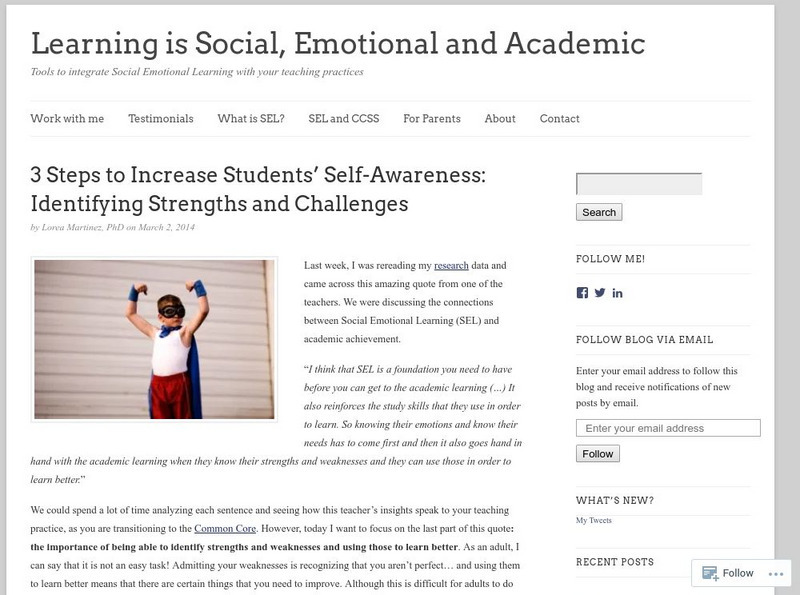Curated OER
Understanding Self-Injury
Students brainstorm about the topic of self-injury, then read a fictional letter and discuss the issues involved. In this health lesson, students select possible responses from a set of cards and determine the effect of the responses. In...
Curated OER
Amazing Apes
Students explore the world of apes. In this reading skills instructional activity, students complete a jigsaw reading activity (the reading material is not included) regarding orangutans.
Other
Naeyc: Teaching Emotional Intelligence in Early Childhood
In this article from National Association for the Education of Young Children, information about the importance of teaching emotional intelligence skills is shared.
Education.com
Education.com: Problem Solved
[Free Registration/Login Required] Problem-solving skills can be practiced and strengthened over time with puzzles such as Tangrams! In the social-emotional learning activity Problem Solved, your child will explore problem-solving...
Other
Helpguide: Understand, Prevent and Resolve Life's Challenges
Professional and unbiased information for those seeking knowledge regarding a particular area of health and wellness. Modules are broken down into aging, children and family, healthy lifestyles and mental health. Comprehensive and...
PBS
Pbs Learning Media: Asu Compass for Courage: Module 2: s.w.a.p. Student Practice Challenge
Situation or worry requires students to develop an action thought (S.W.A.P.) for a variety of sample scenarios provided.
PBS
Pbs Learning Media: Asu Compass for Courage: Module 1 Practice Challenge
Match It! Game Cards to print, cut out, and play at home. Characters (top row) and Feeling Words (bottom row). This game reinforces what students have learned about the ways anxiety, worry, or fear show itself. It can be completed...
Other
Pre K Grade 12 Standards
Here are standards "designed to assist school districts in examining the quality of their programming for gifted learners." "Program Design," "Curriculum and Instruction," "Socio-Emotional Guidance and Counseling" and other parts of the...
Other
Kids Helpline: Empowering Young People to Ask for Help
Being able to ask for help when you need it is an essential skill. This article discusses how to overcome the challenges kids and teens face when asking for help.
PBS
Pbs Learning Media: Sesame Street: Resilience
Giving new things a try helps children learn, grow, and take on challenges! These resources teach kids and parents that they are always growing and learning!
Curated OER
Kids Health: Welcoming a New Baby Into Your Family
Having a new brother or sister can create many opportunities and challenges for you. You can show how responsible you can be by helping as much as you can. You will have to deal with all the attention that the baby receives from your...
Other
Seymour Community School District: 10 Rhetorical Devices [Pdf]
A slideshow discussing ten rhetorical devices, with links to examples, in-depth information, and a video. Covers logos, ethos, pathos, analogy, metaphor, irony, personification, rhetorical question, tricolon, and maxims. Presents a...
Other
Social Thinking: Teaching Students About Their Learning Strengths and Weaknesses
This lesson is about teaching our students and adults how to understand their social learning challenges in the context of their overall abilities and then how they can use their strengths to learn more strategies related to their...
Understood For All
Understood.org: Strengths Chain: Hands on Activity
To help kids thrive, recognizing their strengths is just as important as working on their challenges. Here's a cool - and crafty - way to identify kids' strengths and connect them in a paper chain, or a "strength chain".
PBS
Pbs Learning Media: Arthur: Aim Buddy Project: Educator's Guide
The complete AIM Buddy Project educator's guide to the social-emotional program complete with planning guides for the classroom.
Curated OER
Kids Health: Grades 3 to 5: Feeling Sad
These social-emotional learning lessons will help students learn how to deal with sadness
PBS
Pbs Learning Media: Sesame Street: Veterans
In every adventure, some things change, but others stay the same. Use this page as a way to talk about the things that are the same, things that are different, and things that you'd like to keep the same, perhaps family traditions or...
Code.org
Code.org: Lesson 2: Persistence & Frustration: Stevie and the Big Project
In this lesson, students will develop an understanding of what it means to be frustrated while working on a large project. It's possible that not every student will experience frustration with this activity, but there are many...
PBS
Pbs Learning Media: Peg + Cat Camp: Collection
Peg + Cat Camp engages preschoolers in fun, informal learning experiences in math and problem-solving. By incorporating friendly PBS characters, engaging activities, and social-emotional strategies, children learn to work as a team,...
ReachOut USA
Reach Out Usa: How Can I Develop Coping Strategies?
ReachOut fact sheets are written by young people for young people and edited by a mental health professional. This page has tips for how to cope with challenging situations and events.
Other
Children Now: Talking With Kids About Tough Issues: 10 Helpful Tips
Parents are encouraged to talk with learners about challenging subjects like sex, violence, and alcohol. Topics included are the 10 tips for talking with kids about tough issues.
Understood For All
Understood.org: 5 Steps for Recognizing Strengths in Kids
Knowing your child's strengths can help you build their self-awareness and self-esteem. You can also use those strengths to work on challenging areas in ways that aren't as frustrating. Following these steps can help you recognize your...
Khan Academy
Khan Academy: Learn: My Kind of Cool
Listen to successful people who have struggled with belonging academically and with their school peers and how they conquered those challenges.
Other
Lorea Martinez: 3 Steps to Increase Students' Self Awareness
Students (and adults) who can identify their strengths will be more likely to build on them to improve their areas of growth; they will probably have greater motivation and will be more self-confident. Here are 3 suggested steps to talk...














